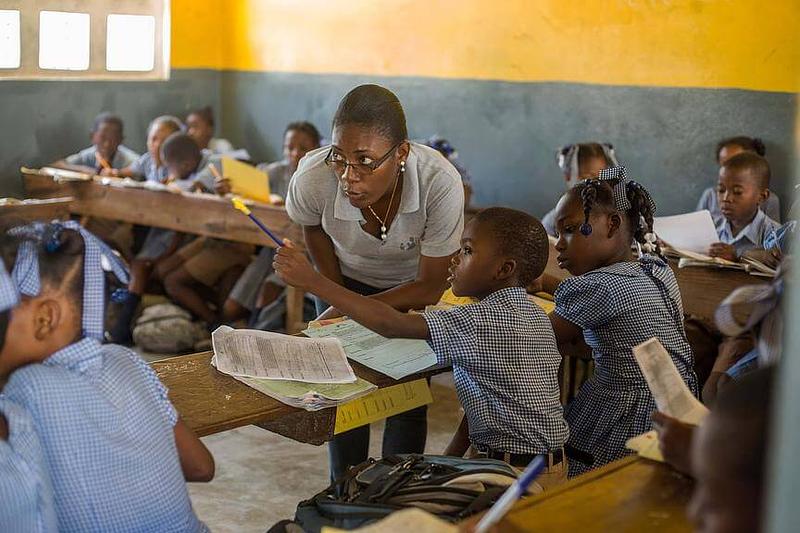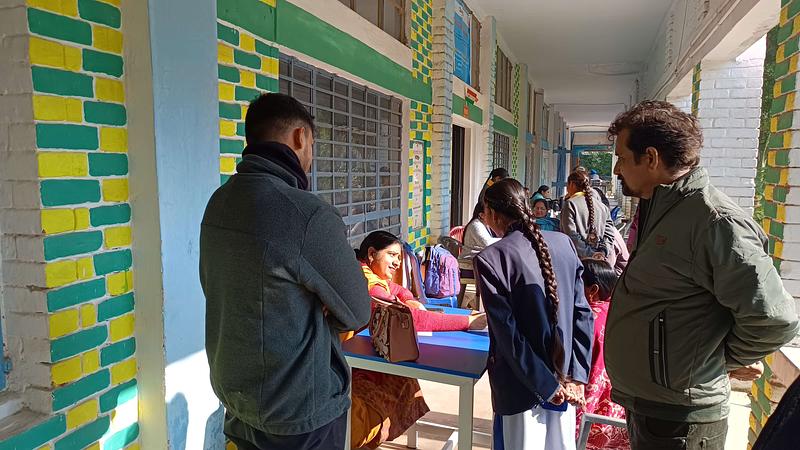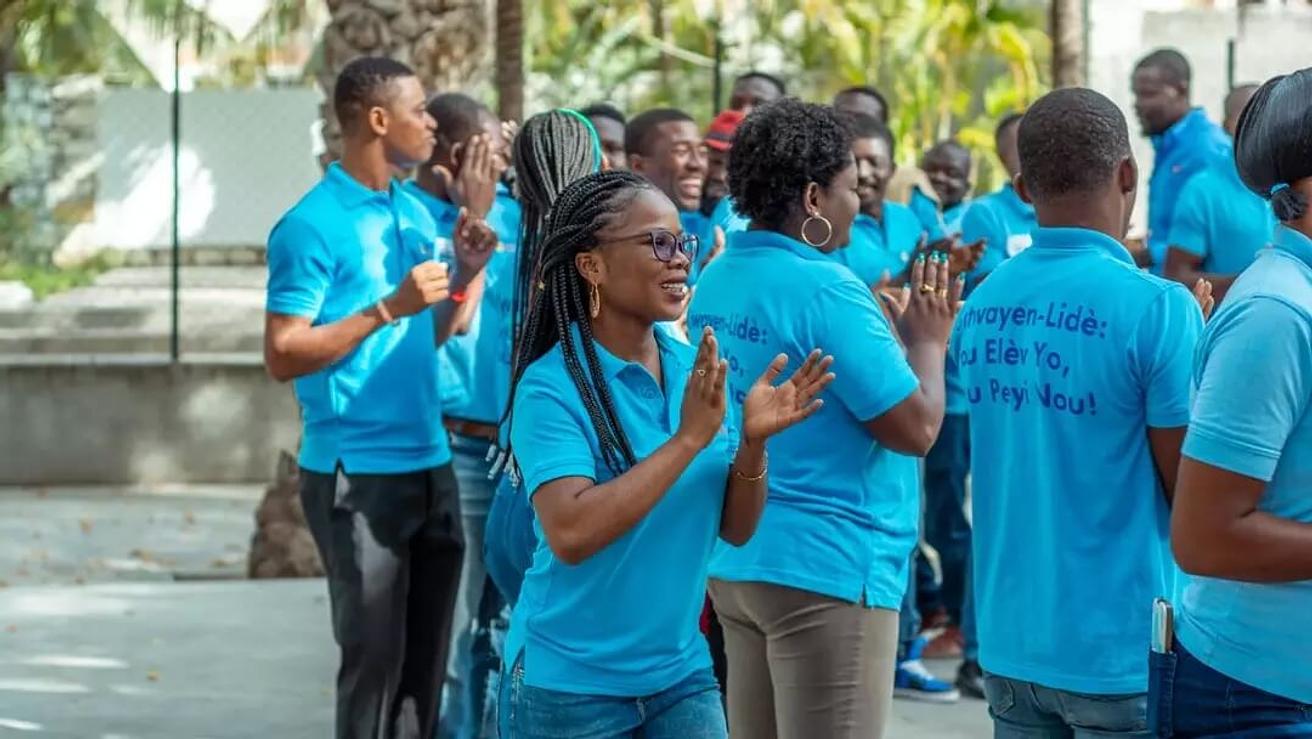But far from being boring and procedural, three innovations from the 2024 HundrED Global collection show us how empowering community members to take a proactive role in how their schools are run can be a radical act. Anseye Pou Ayiti, Citizen Leader Lab, Samarthya are using schools to move past the shadows of colonial past and invite more voices into conversation of what our schools should be doing, what they need, and where we want them to go.
Leaders for Education brings together business leaders, school leaders, and community leaders to improve school functioning.
Why is governance so important? UNESCO finds that governance of education systems is a crucial deciding factor in determining the quality of services that are delivered across the spectrum: closing learning gaps, improving and retaining teacher quality, implementing evaluation and assessment, and generally ensuring student wellbeing. OECD findings show that, across member nations, nearly one in three decisions are made without guidance from or consultation with higher authorities. Of course, school autonomy is important to keep up with local needs as they arise. Equally important is equipping decision makers with the tools required to evaluate, implement, and review the choices they need to make.
"Good school leadership brings management teams and teachers together to form a cohesive school community that reignites teachers’ passion and enthusiasm for teaching and delivering quality education"
That’s the motivation behind Leaders for Education, an innovation created by Citizen Leader Lab in South Africa. Most commonly, South African principals are trained as educators rather than managers, meaning they often lack the tools required to successfully run a school. Recognising that good leadership has skills that are transferable across industries, Leaders for Education pairs school leaders with counterparts from the business world. The partners then embark on a year-long cohort programme where they hone leadership skills, take part in structured social and action-based learning, build a community of practice, and receive one-on-one leadership coaching.
Good school leadership is key to combating inequities in education, says Melanie Weeks, the organisation’s chairperson. It helps “create networks that increase resources and social capital in schools, helping less resourced schools have access the opportunity to develop the libraries, science labs, support structures and other to put them on par with the traditionally better-resourced schools.” But given the wide sphere of influence of school leaders, it also helps ensure that the next generation of South African learners have strong role models of how to manage groups, be accountable, and to learn from one another. "Good school leadership brings management teams and teachers together to form a cohesive school community that reignites teachers’ passion and enthusiasm for teaching and delivering quality education. When being taught by teachers who love their jobs and encourage them to excel, learners become more motivated and are more willing to take their studies seriously," Melanie tells us.

Teacher Leaders implement culturally- and community-rooted pedagogy in Haitian classrooms
Role modelling and local empowerment is the motivation behind Anseye Pou Ayiti as well. Haitian schools face tremendous challenges from political and economic instability to inadequately developed teacher training programmes. Education was significantly impacted by the COVID crisis as well as the two catastrophic earthquakes in recent years. But hanging over all of this is the geopolitical history of colonialism and slavery which left Haiti stripped of resources, constantly on the back foot. These impacts are especially evident in education: less than 30% of students in rural Haiti, where the majority of the population live, complete primary school. Just one student in a hundred will study at a university. Anseye Pou Ayiti seeks to reinterpret the narrative and give Haitians full ownership and control of the educational system.
"We believe that parents deserve a seat at that table where decisions related to their child's education are made. Their voices need to be heard and deliberated upon"
What does this mean in practice? Uplifting local teachers and equipping them with the tools to teach more effectively and more equitably: Lessons Kreyòl rather than French; teaching methods proven to be more effective than rote memorisation; civics lessons to ensure that students know their rights; and the abolition of corporal punishment. The programme works by recruiting cohorts of teacher leaders, school leaders, and parent leaders to improve how schools are run for all - and how schools and communities work together for true social justice. The ripple effect has been clear: retention of school personnel is at 95%, and student achievement rates are double that of national averages for primary school. The programme alumni are taking larger roles within the Haitian Ministry of Education. Perhaps most importantly, the alumni - teachers, school directors, and parents - are working together in their communities to create solutions. They are spearheading key practices, policies, and paradigms to ensure all children have their human right to a high quality education.

SMCs were envisioned to promote parental engagement in Indian schools
The combination of parents, teachers, and leaders is a winning formula for ensuring effective schools. Often, though, parents are excluded from the conversation. There are many reasons why this may happen: it’s inconvenient to reach them; schools are considered the domain of teachers only; parents don’t know what they can or should ask for; power asymmetries arising from gender, caste, religion or financial inequities. The Indian Right to Education act sought to combat this by mandating School Management Committees (SMCs) be formed in local schools. These were envisioned as spaces where parents could influence school decisions with parent representative comprising 75% of the SMC and at least 50% being women. But even though the structure required diversity and parental representation, Samarthya found that the SMCs weren’t achieving the hoped-for outcomes.
"We believe that parents deserve a seat at that table where decisions related to their child's education are made. Their voices need to be heard and deliberated upon," says Sahil Babbar, Samarthya's lead for Development and Communication. "While SMCs exist, they are far from being an active participative space. This innovation was needed to realise the spirit with which SMCs were formed; to ensure that there is participation of the public in the governance of public schools of the country."
Their innovation, Democratizing Governance of Public Schools, seeks to help this powerful tool reach its full potential. They, in partnership with education administrators, train parents on what the roles and responsibilities of SMC members are, but they also coach parents on how to identify the things they want to change and how to collaborate effectively to achieve them. This is no small task - already they are increasing parent participation at more than 30,000 schools across the states of Nagaland, Haryana and Punjab. In each of these schools are individual obstacles and challenges to be met: improving teaching practices, repairing leaky pipes, building community rapport. Samarthya’s work is instrumental in connecting policy to parents on the ground.
Good governance is vital for effective school systems, and effective school systems are instrumental in improving equity and lifetime wellbeing. Innovations like Anseye Pou Ayiti, Citizen Leader Lab, and Samarthya show that empowering community members to participate in school governance can lead to significant improvements. These initiatives are helping to overcome historical and systemic challenges, and are paving the way for more inclusive and effective education systems.
If you are working on something innovative in education, we want to hear about it. Share your innovation with us for the opportunity to be featured in our next Global Collection.
Header photo: ©Anseye Pou Ayiti
